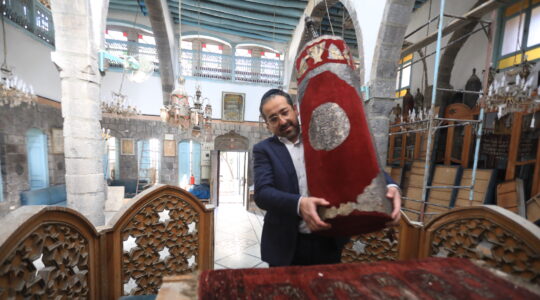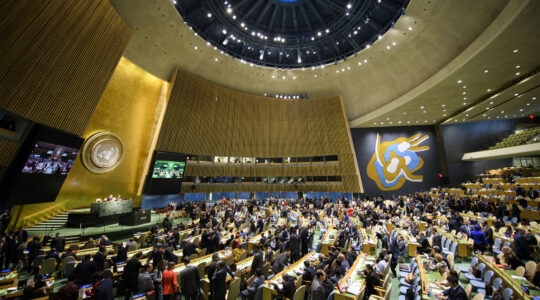MONTEVIDEO, Uruguay, Dec. 13 (JTA) — Recent leadership elections have split the Jewish community of Uruguay, with the sides trading accusations of secret pacts and voting irregularities.
The elections were to determine who would lead the largest and most powerful segment of Uruguay’s Jewish community. However, a post-election merger between the No. 2 and No. 3 parties has shifted the balance of power and sparked controversy in the community.
On Oct. 22, some 1,460 members of the Israelite Community of Uruguay, or Kehila, elected a 33-deputy board to choose a president and other authorities for the next three years.
The clear winner was Dor Chadash, a coalition of independent parties headed by Armando Poziomek, a 49-year-old accountant. His group won 47 percent of the vote, which garnered 16 deputies.
Next was a coalition of the Labor, Meretz and Bund parties led by Max Sapolinski, a 46-year-old accountant and Uruguay’s former vice minister of economy and tourism. That list won 32 percent, or 11 deputies, followed by Alberto Buszkaniec’s Likud, with 20 percent, or six deputies.
Historically, said Armando Litvan, the No. 2 official of Dor Chadash and president of both Hillel Uruguay and the local Israel Bonds chapter, the list that won the most votes formed the Kehila’s government — and no group ever won as high a percentage as did Dor Chadash.
This time, however, “the other two lists got together because they had a previous secret agreement,” Litvan claimed, “and with their 17 combined deputies they named a president” — Sapolinski.
“This may be legally correct, but from our point of view, morally it is not,” Litvan said. “Today it’s clear that there were not three options, only two, but the people didn’t know that at the time.”
Poziomek agrees.
“I won 47 percent of the vote, which means nearly half the community understood that there were a lot of things that needed to change,” he said. “And what happened is totally unjust.”
Not true at all, retorts Sapolinski, who denies any pre-election deal. Under the power-sharing arrangement, he will serve as president until May 2008. Buszkaniec, the third-place candidate, will serve the remaining year and a half of the presidential term.
“This is not an injustice, simply a system to elect leaders,” Sapolinski told JTA. “If nobody gets an absolute majority, you must make agreements to elect leaders.”
Dor Chadash, he said, “didn’t want to be a part of the coalition. If somebody thinks the system is unjust, then he should change the system.”
With membership estimated as high as 12,000, the Kehila is by far the largest and most powerful of the four groups that comprise Uruguay’s Jewish community. There’s also a Sephardi group with about 3,000 members; the New Israelite Congregation, formed by German immigrants, with some 2,000 members; and a Hungarian group with a few hundred members. Each group sets its own policy, but since the Kehila accounts for most of Uruguay’s Jewish community, its decisions have more impact.
At one time in the early 1970s, Uruguay had nearly 50,000 Jews. But the community strongly encouraged aliyah, and today at least 15,000 Jews of Uruguayan origin live in Israel.
The Jewish population remaining in Uruguay has dropped to about 18,000, a consequence of economic chaos over the past five years. Those who didn’t go to Israel went to Brazil, Argentina and the United States. More than 90 percent of the country’s remaining Jews live in Montevideo, the capital.
Yet Jews still have influence in this country of 3 million people, and members of the community have achieved prominence in politics, including Montevideo Mayor Ricardo Ehrlich.
There are eight functioning synagogues in Uruguay. Although Chabad-Lubavitch has a presence here, few Uruguayan Jews consider themselves Orthodox, and no more than 100 families keep kosher.
“Uruguay is a secular country, so secular that officially, there’s no Christmas on Dec. 25 but rather a Dia de la Familia,” or Family Day, Litvan said. “Because religion was never that important in either Uruguay or the Jewish community, we identify more with Zionism and political parties in Israel and Europe.”
Buszkaniec, 57, is an electronics importer who has been heavily involved with the Uruguayan Jewish community’s Likud Party for 15 years. He defends the power-sharing accord, noting that “it’s the same as in Israel. It’s not a direct election. You need 50 percent plus one, and the council chooses the president.
“I personally offered Armando Poziomek three years, each year headed by a different president beginning with Sapolinski, then me, then him. He didn’t want that.”
After the No. 2 and 3 lists received a combined 53 percent of the vote, “I offered to split the term of office half and half with Poziomek, but he refused that, too,” Buszkaniec added.
Poziomek counters, “How in any way could we share a presidency? That’s like Bush offering to split the four-year term of office with Gore, two years each, because the vote was so close. It wouldn’t be efficient for the Kehila, and it would be a very grave mistake. Either one is the president or the other, but not both.”
Both factions have taken out full-page advertisements in the local Jewish weekly, Semanario Hebreo, seeking support for their positions.
If there’s any point on which the opposing sides agree, it’s that nobody is really happy about the outcome.
“The campaign took on a bitter tone,” Sapolinski acknowledged. “The people who participated directly in the list are angry, but on the rank-and-file level, this will pass rapidly. I don’t think this is a big deal. It was an unfortunate moment, but it’s not a crisis for our community’s future.”
JTA has documented Jewish history in real-time for over a century. Keep our journalism strong by joining us in supporting independent, award-winning reporting.





